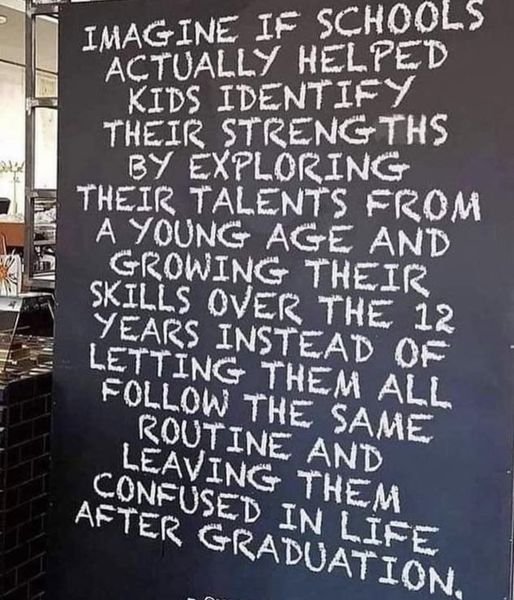Imagine if...
When I saw this posted on Facebook recently, it immediately spoke to my understanding of both self-directed learning and the Japanese term, ikigai.
The idea of helping kids identify their strengths (and interests) implies that education should allow the learner to lead, not the curriculum. In other words, the learning should be self-directed.
The idea of ikigai, however, is a little more nuanced. A rough translation is that ikigai is ‘the reason one gets out of bed in the morning’; your purpose or motivation. Many will find considering this daunting and it could be if the purpose is something as grand as promoting world peace, eliminating hunger, or solving climate change. Ikigai could be these very worthy pursuits, but the intention, I believe, is to make goals such as these more realistic, local, and obtainable. Tending to one’s garden and sharing the harvest, for example, could be one’s version of environmental stewardship and feeding others.
For many, determining one’s purpose can be a challenge. That is why the term ikigai can be broken down to four manageable questions one can ask themselves to help them focus. Those 4 questions are:
What do you love? - This should be easy. Create a list of things you love or enjoy. It could be food, entertainment, people, objects. Anything. Examples could be chocolate, jazz, bowling, Nelson Mandela, the Grand Canyon.
What are you good at? - Reflecting on this could be tricky as it is hard to be honest or clear about what skills and talents we possess. Having a trusted friend, family member or someone who knows you well provide some examples will likely be more accurate. For instance, they could highlight that you are diplomatic, someone who writes well, has a creative sense of humour, or is a good organizer.
What does the world need? This can be done either by taking the list from the first two questions and looking for matches of interest and abilities OR by seeing what problems need to be solved that connect to the results of the first two questions.
How do you get paid or earn a living based on the match? This is the most utilitarian or practical question of the four. This question matches what you love, the skills you possess, and the needs of the world to work that can provide one a living. Of course, if a person is comfortably retired or not looking for work, this question can be ignored.
I believe these 4 questions, asked and followed up upon often, would do a great deal to answer what the author of the words in the picture is imagining. Education would be a clarifying, life affirming experience as opposed to a confusing, muddled one. A self-directed learning program allows learners to avoid blindly following a curriculum and provides a framework to finding their purpose. Isn’t that what education really should do? Imagine if…

